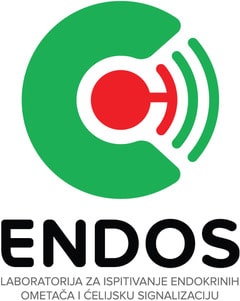Research fieldMembersCurrent projectsEquipmentCooperativesCorrespondent
 Laboratory research objectives are focused on deciphering mechanism of action of chemicals known as endocrine disruptors (ED), which are routinely found in our environment and which are known to interfere with hormone homeostasis. The emphasis is on detecting affected cellular events, signaling pathways, altered gene expression and epigenetic marks.
Laboratory research objectives are focused on deciphering mechanism of action of chemicals known as endocrine disruptors (ED), which are routinely found in our environment and which are known to interfere with hormone homeostasis. The emphasis is on detecting affected cellular events, signaling pathways, altered gene expression and epigenetic marks.
Main research topics include:
- Impact of ED on reproduction. Impact on reproduction is being assessed by investigating mechanism of ED action in human and rat ovarian steroidogenic granulosa cells and in human spermatozoa. Both signaling and different reproductive parameters are evaluated.
- Impact of ED on development. Impact on development is studied by exposing zebrafish embryos (Danio rerio) to ED and evaluating effects both while in embryonic stage and in adulthood, with the emphasis on gene expression, epigenetics and histology.
- Impact of ED on vascular endothelial cells, both in chronic and acute experimental set ups. Signaling and different cellular events are evaluated.

Dr Nebojša Andrić
Assistant professor

Dr Jelena Marković Filipović
Associate professor

Dr Svetlana Fa
Senior research associate

Dr Kristina Pogrmić-Majkić
Senior research associate

Dr Dragana Samardžija Nenadov
Research associate

Msc Dunja Kokai
Research trainee

MSc Biljana Tešić
Research trainee
- Common phthalate DEHP and women’s reproductive health risk assessment: mechanistic and chronic low-dose exposure studies. The Science Fund of the Republic of Serbia.
- Curricula development in the fields of reproductive biology/assisted reproductive technologies and regenerative medicine in Serbia (ART-REM), 586181-epp-1-2017-1-rs-eppka2-cbhe-jp, 2017-2020. ERASMUS+ KA2 program – Cooperation for innovation and the exchange of good practices –Capacity Building in the field of Higher Education.
- MSC-Advantage™ Class II Biological Safety Cabinets, Thermo Scientific
- Fluorimetar Fluoroscan Ascent Plate Reader, Thermo–Labsystems
- MyECL, Thermo Scientific
- BioSpec-nano, Shimadzu Biotech, Zebrafish Facility
- Swiss Federal Institute of Aquatic Science and Technology, Dübendorf, Switzerland
- Department of Physiology and Toxicology of Reproduction, Jagiellonian University, Kraków, Poland
- Faculty of Biology, University of Sofia, Bulgaria
- Department of Biomedicine, Aarhus University, Denmark
- Faculty of Veterinary Medicine, University of Belgrade
- Faculty of Medical Sciences, University of Kragujevac
- Faculty of Medicine, University of Novi Sad
- Scientific Veterinary Institute Novi Sad

Dr Nebojša Andrić
Assistant professor

